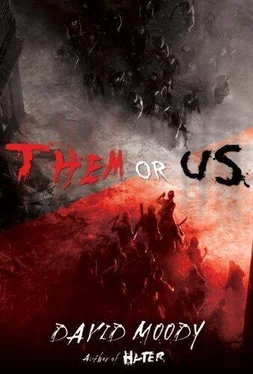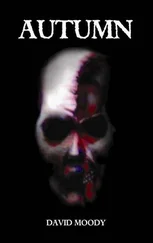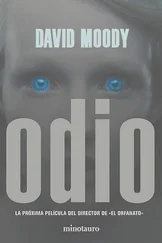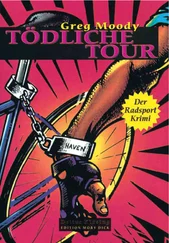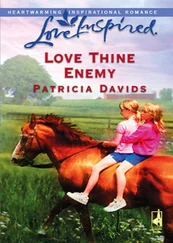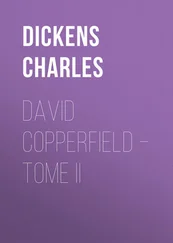48
I CAN TASTE BLOOD in my mouth, and I’m dragging my right foot now more than walking on it, but I’m almost there. I followed the intermittent tire tracks left by the others for as long as I could, then took a shortcut across the fields I worked in when I was last here.
The ice-cold air seems to numb the pain. The falling snow reminds me of ash drifting down, and I feel a sense of déjà vu, remembering walking along the highway just after the bomb. I remember lying on my back on the warm, sticky asphalt, watching Ellis as she disappeared alone into the radioactive gloom. The memory of everything I lost that day is enough to keep me moving toward the center of Southwold. I might still be able to help the rest of the Unchanged get away. More than that, I don’t want to die out here on my own.
I stagger into the village, feeling myself fading with every slow step I take forward. Everything looks different here today, so much so that I’m not entirely sure this is Southwold at all. The dusting of snow makes everything look featureless and plain, but that’s not the real reason for my confusion. The tips of the wreckage of those buildings destroyed by Hinchcliffe’s fighters peek out through the ice, almost as if they’re ashamed to be seen, and the pointless devastation is incredible and heartbreaking. Parts of the village have been virtually demolished; all of it now appears uninhabitable. There are row after row of burned houses, almost every building ruined, and my disorientation continues to increase until, at last, the distinctive outline of the lighthouse appears up ahead of me. Perhaps one of the only buildings left undamaged, its outline is blurred by another flurry of snow. Using its tall, tapering shape as a marker, I head straight for it, alternately looking up at its unlit light, then down at the undisturbed snow lying all around me, desperate to find more tire tracks or footprints. They’ll be hiding inside. No Unchanged with any sense would risk being caught out in the open.
I cross the intersection and walk past the ruins of the hotel from where John Warner used to run this place. The building has been completely gutted by fire, as have many of the surrounding buildings. There’s a mound of charred, snow-covered corpses in the middle of the village square, blackened limbs entwined, burned faces staring into space. I force myself to look away, and I remember this place as it was when I was last here. John Warner had genuinely good intentions, but he was wasting his time, I realize that now. What’s left of my side of the human race is fucked: doomed to repeatedly beat itself into oblivion until there’s nothing left of it but ashes and a handful of empty, hollow men like me.
I take a wrong turn through the side streets and have to double back and follow my own footprints to get back on track again. Exhausted, I eventually reach the lighthouse and lean up against the curved outside wall of the building for support, slowly sliding around it until I find the door. I half step, half fall inside, relieved to finally be out of the biting wind. The building is silent like a tomb, and I catch my breath with surprise when I step back and trip over the outstretched arm of a corpse. I look down, and, bizarrely, I feel real relief that it’s someone like me and not one of the Unchanged. Judging from the stink and the discoloration of his skin, this guy’s been dead for a while. Probably one of Warner’s lookouts killed by Hinchcliffe’s men.
I stagger to the foot of the stairs that spiral up inside the lighthouse and listen hopefully, but I don’t hear anything other than my own labored, panting breaths. Maybe they’re hiding at the top of the tower?
“Joseph,” I shout, my voice echoing around the confined space. I wait for an answer, but none comes. “Joseph, it’s Danny.”
Still nothing.
I start to climb, knowing I have no choice but to check every inch of the building to be sure, and wishing we’d agreed on a meeting place with fewer stairs. I have to stop after every third or fourth step, and psych myself up to climb higher. I crane my neck upward, searching for movement in the shadows way above me. Where the hell are they? With each step I take, the more obvious it becomes that Joseph and the others never made it to Southwold. Anything could have happened to them once they’d left the bunker. Those tracks in the snow, they could have been made by anybody. With Lowestoft imploding and much of its surviving population leaving the town, this area might well have been crawling with people who would have killed the Unchanged in a heartbeat—massacred every last one of them before they’d even stopped to question why they were there or how they’d managed to survive for so long—and if the refugees didn’t get them, it was even more likely that Ankin’s troops would have. With hindsight, trying to get away from the bunker now seems the most stupid and sacrificial of moves. Even so, they had to try. They couldn’t just sit there and wait to die. I shout out a couple more times as I continue to climb, but each time the only audible reply comes from my own voice echoing back at me.
Finally, legs trembling with effort, virtually having to crawl the last few steps on my hands and knees, I reach the top of the lighthouse. I use a rail to haul myself upright, then push myself through the door and out onto the observation platform. The wind’s even stronger and colder up here, and I have to hold on tight just to stay standing. I lean back against the glass that surrounds the huge, useless lamp and stare out toward the sea, barely able to support my own weight any longer. I’m filled with an overwhelming, crushing sense of disappointment that they’re not here, and it’s all I can do to keep myself upright. Looking out into the nothingness of the gray clouds and falling snow, I find myself imagining how the Unchanged might have been caught. I picture Joseph trying hopelessly to reason with Hinchcliffe’s Neanderthal fuckers or Ankin’s troops, whichever found them first. I picture the little girl Chloe trying to run from them, bare feet crunching through the snow as she’s chased down by a pack of the foul bastards …
I’ve had enough.
The more effort I put in, the less I achieve. It’s time to stop. Maybe I should just go back inside, drag up a chair, then sit back and watch the sun rise as many more times as I can before I go. No one will disturb me up here. No one will know where I am. More to the point, no one will care.
Is this the moment where my life starts flashing before my eyes? Isn’t that what’s supposed to happen now? Just for a second I allow myself to drift back and remember things as they used to be before the war: the hellhole of an apartment I used to live in with Lizzie and the kids, doing a mindless job for a pittance pay, barely making ends meet, the endless arguing and struggling with the kids, all the grief I used to get from Harry … but I’d still rather be there than here today. Christ, I spent so much time focusing on the negatives that I completely missed the positives, which were there in abundance. The security, the relationships, being safe within the four walls of our home, the closeness I had with Lizzie and the children … It’s an old cliché, but it’s so true: You never realize what you’ve got until you lose it. I remember the war and all the killing—the joy and euphoria I used to feel whenever I ended an Unchanged life. To think, for a time I was thankful for the Hate and the freedom I thought it gave me. Now, even though I try hard not to, I find myself thinking about Ellis again, remembering what the Hate did to her and what she became. What it did to all of us …
It must be time now.
I lean back against the window and look out to sea, numb with cold, weak with effort, and hollow with disappointment. I’d go back inside, but I’m too tired to move. Everything’s too much effort. Maybe I’ll just sit here and—
Читать дальше
